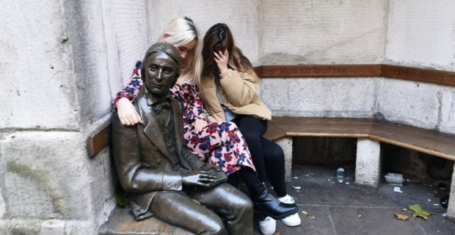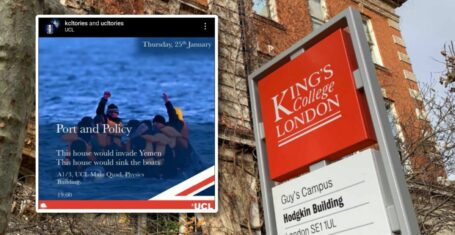
We asked students to share their experiences with King’s counselling service
‘The counsellor told me I needed four more years of therapy’
It’s been a while since I interviewed Andrew* about his experience of King’s Counselling service and many readers were concerned by his account. I decided to speak with other students to discuss their stories to find out if Andrew’s case was an isolated one.
Speaking to The Tab, 18-year-old Sara* told us about her brief encounter with the service: “Personally I went through a crap time with family stuff and adjusting to university before Christmas was difficult. Support was quite hard to get, so I can’t imagine what it’s like for people with longer term issues.
“The lady I saw was really nice but she was always watching the clock – it just felt like the service was completely over stretched. That is probably why they tell students to go to A&E. I was told that if I wanted longer term counselling or mindfulness sessions I’d have to pay privately. How can students afford that?”
This picture of an over-stretched, over-crowded counselling service comes up in people’s stories time and time again. Expecting students to cough up money instead though is unrealistic and can lead to students feeling more stressed and vulnerable.
This is what Andi* had to say about their time in the service: “I managed to get six sessions during the second year through KCL counsellors. The process was slow, probably because it’s overloaded. They also never gave me a choice of gender when I was assigned a councillor.
“I had a generally good councillor but he did comment that he felt I didn’t trust him – and a part of me didn’t because I was constantly uncomfortable talking about my experiences of sexism and gender-based violence with a male counsellor. I’m sure there are lots of people with similar problems and this really needs to be addressed.
“In my third year I was really in need of support, and applied to the counselling service again. I have a history of mental health problems, both personally and in my family and have made this clear wherever possible. I received no response from the mental health services. Luckily, through the NHS I managed to get six more sessions, but I am now having to pay £30 per session to see a counsellor.”
A similar story comes from another ex-King’s student, Amy*: “I first emailed King’s counselling team in August 2014 before I even started university. I remember the date because I ended up having to compile a list of all the times I emailed and called the service and they never answered or replied. Unfortunately I no longer have access to my King’s email account so I wouldn’t be able to tell you how many other times I emailed or the exact date that I eventually got an appointment. I just remember always getting an automated response, but no one answered my calls or actually replied.
“This went on for about a month when and when I finally got through to someone, they were very apologetic for the lack of response and I managed to get me an appointment for the next week which I think was around early November or late October.”
Ex-student Abi decided to leave King’s after their first year and declining mental health was a contributor to their decision.
“So in my first appointment I explained to my counsellor that I really felt I needed something longer term than the standard six weeks. He said we should do six weeks first and then think about longer term after that. The sessions I had during the six weeks were very helpful, overall I felt l I had a very positive experience and I’m very happy with most of the service I received.
“However, in my last session the counsellor told me he thought I needed about four more years of therapy. He said that there were no more spaces left for longer-term sessions at King’s so he gave me a huge list of mental health services that I could sift through. He suggested seeing a trainee counsellor for about four years which would mean three-five times a week. I found this really frustrating as I had explicitly told him I wanted something long term when I had my first session and I contacted the team in August to tell them this. I assumed there would be places before university started.
“I felt it was really unhelpful to put a ‘time limit’ on how much counselling I needed. It was really daunting and scary to suggest I needed that much but provide little support with helping me access the other services. It wasn’t nice to be given this huge scary list of hundreds of services without any suggestions as to which would be best suited to my situation. I’m dyslexic and it’s quite hard to look through stuff like that.
“I spent the rest of my year at King’s without counselling and with anxiety and mild depression. Eventually I left after my first year and now I’m at a new university and on a new course. The change has made me much happier. I left mostly due to my declining mental health and general unhappiness there.”
Speaking to KCL Head of Counselling Stephanie Griffiths, this is what she had to say on the matter:
“Counselling services at King’s, and most student counselling services, are in high demand and many students report having had a positive experience with our highly trained and experienced counsellors. At certain times of the year, such as the second semester when some final year students require extra support, waiting times may increase. We are doing our best to reduce them through measures such as improved triage and same day appointments with our mental health advisors so that there is an immediate source of support available for students who cannot wait to see a counsellor.
We always prioritise those students who are most at risk and students and tutors should have the confidence that we will offer those most in need an early appointment. We would encourage anyone who has concerns about their experience with the Counselling Service to contact us so that we can investigate and make further improvements.”
If you or someone you knows suffers as a result of mental health, they can get help at Samaritans or 7 Cups of Tea.
*Names have been changed to protect people’s identities.









































